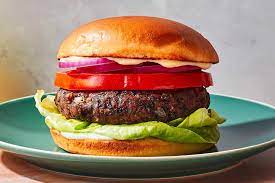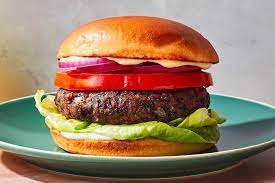Are you looking for a delicious and healthy alternative to traditional beef burgers? If so, then a veggie burger might just be the answer you’re looking for. Veggie burgers have become increasingly popular over the years, offering a tasty and satisfying plant-based option for meat lovers and vegetarians alike. In this article, we’ll dive into everything you need to know about veggie burgers, from their origins and history to how to prepare them at home.
Origin of Veggie Burger: A Brief History
The first veggie burger was created in London in 1982 by a vegetarian restaurant called Cranks. The burger was made from grains, vegetables, and soy protein, and was designed to be a meat-free alternative to the traditional beef burger. The popularity of the veggie burger quickly spread, and by the 1990s, it had become a staple in many vegetarian and vegan restaurants.
What is a Veggie Burger?
A veggie burger is a sandwich that replaces the meat patty with a patty made from vegetables, grains, or legumes. The patty can be made from a variety of ingredients, including mushrooms, black beans, chickpeas, lentils, quinoa, and more. Veggie burgers are often season with herbs and spices to enhance their flavor. And are serve on a bun with traditional burger toppings like lettuce, tomato, onion, and condiments.
Mushroom Veggie Burger
One popular type of veggie burger is the mushroom veggie burger. These burgers are made from a blend of mushrooms, vegetables, and grains and are often praised for their meat-like texture and umami flavor. Portobello mushrooms are a popular choice for mushroom veggie burgers, as they have a meaty texture and can be grilled or roasted to perfection.
Vegetables to Add to Your Veggie Burger
When it comes to adding vegetables to your veggie burger, the possibilities are endless. Some popular choices include spinach, kale, roasted peppers, onions, and garlic. You can also add grated or finely chopped vegetables like carrots, zucchini, and sweet potatoes to your patty mixture for added flavor and nutrition.
How to Prepare Veggie
Burger Preparing a veggie burger is easy and can be in a variety of ways. You can grill, bake, or pan-fry your patties, depending on your preference. To grill a veggie burger, preheat your grill to medium-high heat and brush the patties with oil before placing them on the grill. Cook for 4-5 minutes on each side, or until the patties are brown and heated through.
To bake a veggie burger, preheat your oven to 375°F and place the patties on a baking sheet lined with parchment paper. Bake for 15-20 minutes, or until the patties are heated through and lightly browned on the outside. To pan-fry a veggie burger, heat a non-stick skillet over medium heat and add a small amount of oil. Cook the patties for 3-4 minutes on each side, or until they are heated through and golden brown.
Veggie Burger Recipe
Here’s a delicious and easy veggie burger recipe that you can make at home:
Ingredients:
- 1 can of black beans, drained and rinsed
- 1/2 cup cooked quinoa
- 1/2 cup breadcrumbs
- 1/4 cup finely chopped red onion
- 2 cloves garlic, minced
- 1 teaspoon ground cumin
- 1/2 teaspoon smoked paprika
- 1/4 teaspoon salt
- 1/4 teaspoon black pepper
- 1 tablespoon olive oil
Instructions:
- In a large mixing bowl, mash the black beans with a fork or a potato masher until they are mostly mash but still have some texture.
- Add the quinoa, breadcrumbs, red onion, garlic, cumin, smoked paprika, salt, black pepper, and olive oil to the bowl. Mix everything together until well combined.
- Shape the mixture into 4-6 patties, depending on your preferred size.
- Heat a non-stick skillet over medium heat and add a small amount of oil. Cook the patties for 3-4 minutes on each side, or until they are heated through and golden brown.
- Serve on a bun with your favorite burger toppings.

Health Benefits and Nutritional Values
Veggie burgers offer a range of health benefits, as they are typically lower in saturated fat and calories than traditional beef burgers. They are also a good source of fiber, vitamins, and minerals, depending on the ingredients used in the patty mixture. Some of the potential health benefits of veggie burgers include:
- Reduced risk of heart disease
- Lower cholesterol levels
- Improved digestion and gut health
- Increased intake of vitamins and minerals
- Better weight management
The nutritional values of veggie burgers can vary widely depending on the ingredients used, but most veggie burgers are a good source of protein, fiber, and complex carbohydrates. Some popular ingredients used in veggie burgers and their nutritional values include:
- Black beans: High in protein, fiber, iron, and folate
- Quinoa: High in protein, fiber, magnesium, and phosphorus
- Mushrooms: Low in calories and fat, high in vitamins and minerals like potassium, vitamin D, and B vitamins
- Lentils: High in protein, fiber, iron, and folate
- Chickpeas: High in protein, fiber, and iron
Frequently Asked Questions
Q: Are veggie burgers vegan?
A: Not all veggie burgers are vegan, as some may contain eggs or dairy products. However, many veggie burgers are vegan-friendly and can be a great option for those following a plant-based diet.
Q: Can you freeze veggie burgers?
A: Yes, you can freeze veggie burgers for later use. Simply wrap them tightly in plastic wrap or aluminum foil and store them in the freezer for up to 3 months.
Q: Are veggie burgers healthy?
A: Veggie burgers can be a healthy option, depending on the ingredients used in the patty mixture. Look for veggie burgers that are with whole food ingredients and are low in sugar and process ingredients.
Conclusion
Veggie burgers are a delicious and healthy alternative to traditional beef burgers, offering a range of health benefits and nutritional values. From their origins in London in the 1980s to their popularity today, veggie burgers have come a long way and continue to be a staple in many vegetarian and vegan diets. By following our tips and recipe ideas, you can easily prepare a delicious and satisfying veggie burger at home, and enjoy all the benefits that come with a plant-based diet.
See Also: https://infoblog4all.com/vegan-lasagna/

